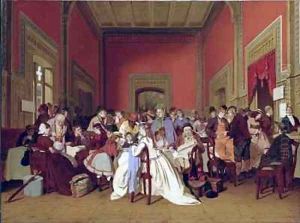Carl d'Uncker Paintings
Carl d'Uncker was a Swedish painter and visual artist, known for his contributions to 19th-century Swedish art. Born on January 5, 1828, in Stockholm, Sweden, he grew up in a period when Swedish art was influenced by Romanticism, which often emphasized emotion and individualism as well as glorification of the past and nature.
D'Uncker's artistic journey began under the guidance of various prominent artists of the time. He studied at the Royal Swedish Academy of Arts in Stockholm, which was the primary institution for art education in Sweden. His education there would have included traditional drawing and painting techniques, as well as exposure to the works of contemporary and historical artists. After completing his education, d'Uncker traveled extensively, which was a common practice for artists of the era who sought to gain exposure to different art styles and cultural influences.
Throughout his career, Carl d'Uncker became known for his genre paintings which often depicted everyday life scenes. He had a keen interest in capturing the nuances of social interactions and the atmosphere of the environments he portrayed. His style was characterized by a detailed and realistic approach, with careful attention to light and color. D'Uncker's works are considered part of the National Romantic style, a Nordic variation of Romanticism that emphasized the beauty of the local landscape and the virtues of the people living in harmony with their environment.
Unfortunately, Carl d'Uncker's life and career were cut short when he died prematurely at the age of 38 on May 9, 1866. His death was a loss to the Swedish art community, which had seen in him a talented artist with the potential for greater recognition and influence. Despite his early death, d'Uncker's paintings remain an integral part of Sweden's cultural heritage and continue to be appreciated for their historical value and artistic merit. His works can be found in various art museums and private collections, where they offer a window into the world of 19th-century Sweden.
